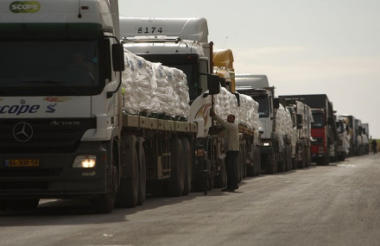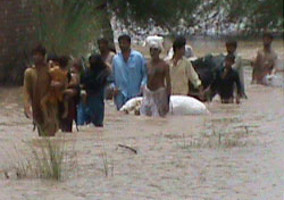Why are people less likely to donate to victims of man-made disasters? Adam Pickering explores the numbers.
Having a public conversation about the way we respond to humanitarian appeals is difficult. The UK is an extraordinarily generous nation - we ranked 5th in CAF’s 2015 World Giving Index and to criticise the basis on which donors make their decisions may seem a little self-defeating. But the process has thrown up some interesting findings.
The Charities Aid Foundation (CAF) has been working with the Disaster Emergency Committee – a union of major British humanitarian NGOs - to understand donor behaviour and perceptions on a number of its appeals including Burma 2008, Asia Pacific 2009, Haiti 2010, East Africa 2011, Philippines 2013 the Ebola crisis and last year’s Nepal earthquake.
Though CAF did not conduct surveys in relation to the Syria or Gaza appeals, we have noted that the DEC calculates that the Syria appeal raised £27m.
This does not compare favourably to other “natural” disaster appeals. The 2004 Indian Ocean tsunami killed approximately 280,000 people and the subsequent DEC appeal raised over 14 times the amount - £392m in the UK (£1,400 per casualty); the Haiti earthquake killed approximately 160,000 and raised £107m (£669 per casualty) and the Nepal earthquake, which resulted in 8,891 deaths raised £87m (£9,785 per casualty). By contrast, the Syria appeal raised just £270 per fatality (at the time of the appeal the estimated death toll was 100,000).
To understand what factors might be influencing donor generosity to humanitarian appeals, we asked additional questions in an online survey looking at donor behaviour in relation to the DEC appeal after the Ebola crisis. One aim of this research was to understand what might be motivating lower levels of giving for what we have termed “human caused” disasters.
It seems that the humanitarian principle, that we have a duty to help everyone regardless of the circumstances and causes of a given crisis, does not have universal public support.
Indeed, in our survey following the Ebola appeal, 38 per cent of people said that they were “likely” to donate following “natural disasters such as earthquakes, flooding and tsunami” but only 20 per cent were “likely” to donate for “conflict and war impacting on civilians”.
Perhaps people feel that human causes of need are more complicated to solve so their money will be less effective. Perhaps they feel that there are dangers of unintended consequences (such as the money getting into the wrong hands).
Perhaps they feel that the people of nations that are suffering from conflict are somehow complicit in their own situation and are therefore less deserving. As unpalatable as this idea might seem, there is evidence that this latter explanation might have some validity.
One study published in the European Journal of Social Psychology in 2010 found that when they changed the cause of a hypothetical flood by introducing a human contribution to its causation (a failed dam), people made significantly smaller donations. The report found evidence of “systematic bias against victims of humanly caused disasters” and suggested that “victim blame” in such instances could be contrasted against a presumption of “self help” and innocence amongst victims of “natural” disasters.
CAF survey
Indeed, our survey found that only 14 per cent of people were “likely” to give following “man-made accidents such as a bridge or building collapse” suggesting that the more transparently man-made an disaster, the less generous people are likely to be.
The survey we conducted following the 2014 Ebola appeal also found that 43 per cent of people agreed that “humanitarian need caused by conflict or war should be resolved by the governments of those countries involved, rather than through charitable giving or international aid”.
Indeed, over a third of respondents thought that the governments of crisis hit nations should deal with the situation alone with 39 per cent agreeing that “humanitarian need, regardless of the cause, should be resolved by the governments of those countries involved, rather than through charitable giving or international aid”.
There is some, but surprisingly little difference in the way people respond to the above questions in relation to social class, income, gender, education or wealth.
However, age seems to play a very significant part with people aged over 65 being more than twice as likely (58 per cent) to agree than 18-24 year-olds (30 per cent) that humanitarian need caused by conflict or war should be resolved by the governments, rather than through charitable giving or international aid and almost twice as likely (49 per cent) as 18-24 year-olds (27 per cent) to agree that humanitarian need, regardless of the cause, should be resolved by the governments of those countries involved, rather than through charitable giving or international aid.
A part of the problem might be the way that disaster appeals are presented to the public.
Media influence
The influence of traditional media on donations to humanitarian appeals has been eroded in recent years. However, television was still listed by 42 per cent of respondents to our survey on the Nepal appeal as their primary source of information (it had been 75 per cent in the 2010 Haiti appeal).
Though television appeals are extremely effective at reaching a captive audience, they offer only very limited time to put any context around the circumstances of the crisis at hand. Indeed, it is far from clear that the way people hear about disaster online – social networking sites were the most common news source on disasters for people aged 18-24 (31 per cent) - affords any greater degree of nuance.
Nevertheless, knowing that donors are somewhat cynical about human caused disasters, perhaps we should work harder to talk about the nature of conflict and government misgovernance.
Perhaps we ought to remind donors that ordinary citizens were no more complicit than the victims of current calamities.
Most rich nations can recall some human caused disaster, be it the extreme poverty caused by the financial crisis of the 1930s or the mass barbarism of the First World War that led to the professionalisation of the Red Cross movement in Europe. Unfortunately, as these disasters recede in our cultural memories there is a danger that we are starting to believe that it couldn’t happen to us. We should not be so complacent.
Adam Pickering is international policy manager at CAF's think-tank, Giving Thought.
Related articles












